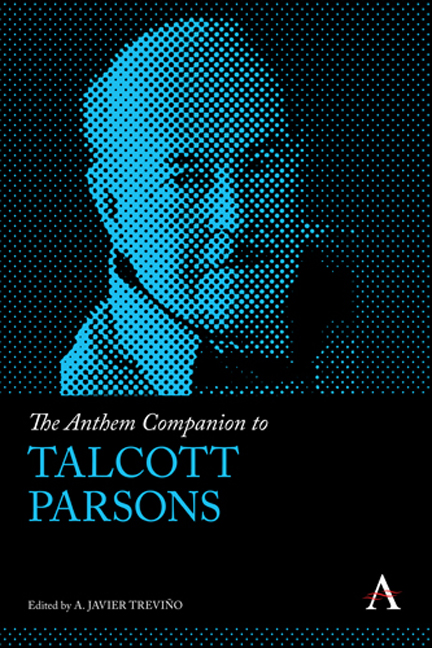Introduction
Published online by Cambridge University Press: 22 July 2017
Summary
There is perhaps no sociologist whose theories, sentiments and political activities have been more misunderstood and subject to mistreatment than Talcott Parsons. This state of affairs stems partly from Parsons's seemingly inscrutable communicative style and partly from ideologically motivated libel—but it is perhaps mostly due to an actively pursued ignorance of his ideas, stemming from any number of reasons. And while Uta Gerhardt's splendid book Talcott Parsons: An Intellectual Biography has done much to clarify and put into proper perspective Parsons's thinking and actions, it has yet to command the attention it deserves in all quarters of the sociological community.
In light of these circumstances, this volume is intended to achieve several objectives. First, it is the latest in a continued effort to inform a rising generation of scholars about the life and work of one of, if not in fact, the most influential American sociological theorist of the twentieth century. Second, it is meant as a corrective to the misinformed but still pervasive notion that Parsons was no more than a mindless structural functionalist, a tool of elitist interests and a grand theorist who had no understanding of actual social problems. And while it took only one generation of sociologists to unjustly characterize Parsons in these ways, it will doubtlessly take several years more before a full rectification, a truly balanced and fair treatment of him, can be realized. Finally, it is, to say the least, regrettable to have to begin a book on the social thought of a prominent thinker by stating what he is not, and so the third and main reason for this volume is an affirmative one: to enter into an earnest discussion of the many important contributions that Parsons made to sociology, sociological theory and particularly to understanding the various social events of the day—then and now.
Before discussing the 11 original chapters that constitute this volume, written by scholars enlisted to address the aforementioned three objectives, I first present a brief life-and-work profile of Parsons for the purpose of providing context for the chapters. For good or ill, the following intellectual portrait (if I may use such a lofty term for what follows) is composed of information derived from one source: Harvard University's daily newspaper, The Harvard Crimson.
- Type
- Chapter
- Information
- The Anthem Companion to Talcott Parsons , pp. 1 - 20Publisher: Anthem PressPrint publication year: 2016

